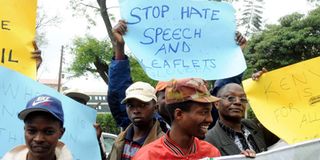Curb hateful rhetoric and poll violence

Locals protest against leaders perpetuating hate speech. Hateful rhetoric by influential politicians can affect their supporters’ behaviour.
Kenya’s electioneering cycles are marked by heightened hateful and divisive discourses. The electorate consumes copious amounts of messaging that camouflages threats and violence against real and perceived opponents.
Such verbal attacks are often ethnic but could be racial or religious. In the recent past, several politicians have been called to account for their utterances.
Hateful rhetoric by influential politicians can affect their supporters’ behaviour. A cursory glance at social media spaces, such as Twitter, reveals a vibrant virtual community where ardent followers and supporters of politicians hurl abuse at their political ‘nemeses’ with abandon.
The aggressive, divisive and dehumanising language often adopted by followers is damaging to the fabric of our society.
Scholars generally agree that political rhetoric is a mechanism of persuasion. It is, as such, a central tool in facilitating political processes and outcomes.
Kenyan politicians have not only taken to this but also often exploited the divides and used inflammatory language in campaigns. That can morph into electoral violence, as witnessed in 2007/2008 and during mini elections in various parts of the county.
The potential for violence, therefore, means players in the political arena have to mind their language. Such players include prejudiced elite speakers, the media, local figures and ordinary people acting as ‘citizen journalists’.
Kenya Human Rights Commission has documented community grievances around land, employment and other material benefits as factors catalysing the rhetoric.
Radio and TV call-in shows and vernacular music have been on the spotlight for acting as amplifiers of hate. The media should, therefore, be on the look-out and lock out peddlers of aggressive rhetoric. Internal mechanisms may be employed—and that is why the Media Council of Kenya initiative to train journalists on elections coverage is laudable.
Flagged contested terminologies
Journalists should be familiar with flagged contested terminologies—sentiments and phrases such as ‘madoadoa’, ‘settlers’, ‘getting rid of weeds’, ‘cutting grass’, ‘beasts from the west’ and ‘the leadership of baboons’. Our vernacular is rich in derogatory allegories; hence, community media should be vigilant while engaging local political actors.
Shifting political alliances, changing narratives, lack of confidence in the capacity of the independent bodies such as the Independent Electoral and Boundaries Commission and the prevalence of misinformation, especially on social media, are additional risk factors that offer fertile grounds for unhealthy rhetoric. They may not breed violence but demonstrate our fragile political processes.
A whole-of-society approach to tackling the issue is apt. The government puts in place measures to mitigate electoral violence by bringing on board multi-sectoral stakeholders in the run-up to, during and after elections. The media must continue to play a leading role in championing peace and cohesion ahead of the August 9 General Election.
Mr Wagunda is a lecturer of communication studies at Rongo University. [email protected].




